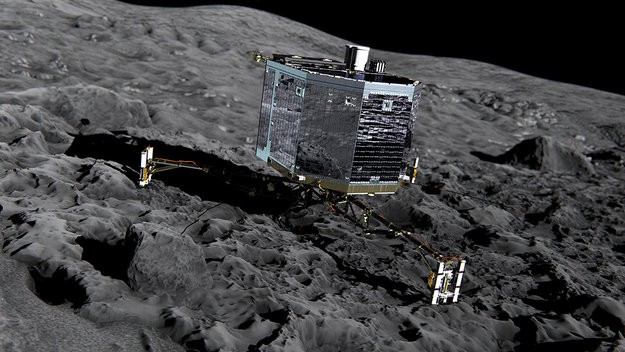European Space Agency's Rosetta mission scientists are expressing their fears and doubts since they have lost contact with the Philae lander on the comet's surface again. Scientists believe that the lander have changed its position and may have moved.
The Philae lander was deployed by the Rosetta spacecraft on the surface of Comet 67P/Churyumov-Gerasimenko, last November. However, due to its bumpy landing, the lander rested under a deep shadow of a cliff, where its solar panels were blocked from getting sunlight to operate and forcing it to enter into hibernation mode.
In a surprising turn of events, the lander had gained enough solar power in June and made its first contact after months via the Rosetta spacecraft. Unfortunately, ESA mission scientists revealed that the lander has been silent since July 9.
Fears were looming that the lander may have changed its location again due to potential jets of gas and dust that are shooting out of the comet's surface as the comet is coming closer to orbit the sun, leading to higher temperatures and increased comet activity.
Due to its shift in location, it is not properly aligned with the Rosetta spacecraft anymore to maintain contact. According to project leader Stephan Ulamec from the German Aerospace Center, after obtaining telemetry data, there were signs that Philae may have moved from its original locations or its antennas could have been concealed or its orientation may have changed to transmit signals.
One possibility is that the lander could have been moved due to activity on the comet's surface since the data revealed that its solar panels are now receiving more sunlight. ESA explains how strongly the sun is hitting the panels which have changed from June to July however, this phenomenon cannot be explained by the comet's seasons alone.
Mission controllers also say that there has been no response after sending recent commands to activate a scientific instrument on Philae to begin an investigation of the comet's magnetic field.
Scientists say that a possible solution would be to change Rosetta's current orbit on the comet to effectively communicate with the lander but the probe apparently became confused since its star reading navigation system could not gather data from the dust that is streaming out of the comet.
Even if the Philae has fallen into silence for now, ESA mission scientists are still hopeful. Ulamec says that there were several times that the lander could have never switched back on but it proved the team wrong when it gained contact last June, repeatedly.



























